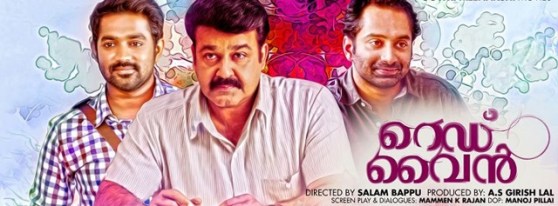Do you have nostalgia about the old Malayalam movies or do you feel nostalgic very often and feels that the Malayalam movies have degraded a lot and the effect of the new generation movies has not been that good? Do you feel that Malayalam movies should go back and be inspired from a former golden age of movie history or at least appreciate that age which was undoubtedly a memorable one? If the answer of these questions is yes, this is a movie you should watch and this is a review you should read. Otherwise, I would suggest that you return to what you were doing before falling into this ocean of nostalgia instead of poking your nose at a place which is not good for the kind of move loving soul which you have. The movie hasn’t done that well as it should have, and it reveals the lack of nostalgia around or rather the inability to sell this nostalgic feeling due to that horrible change which the audience has undergone with the rise of new generation movies and that mindless entertainer power which has cast a shadow on the beautiful woods of nostalgia. If you haven’t left this page yet, I suggest you reclaim it with this movie.
The film’s script which was written by M. T. Vasudevan Nair in the 1970s and was filmed by Hariharan himself with Sukumaran playing the role of the major antagonist, a role which has been passed on to his son with this new version. But as we have heard about it, the older version of the movie didn’t get released. So this remake of the Sukumaran-Venu Nagavally starrer Evideyo Oru Shatru has Indrajith-Vineeth combination instead. The movie might seem a little bit old generation for the liking of most of the people, but one thing that most of the viewers have to keep in mind is that in spite of all the changes that has come upon the world, may be with laptops, mobiles and tablets taking over what was to be their absence, the environment remains the same. The story of the subaltern undergoes no significant change as a whole, no matter how much the man can claim to have improved and changed their attitude towards their fellow beings. Another thing is that there will always be something in this world that humanity shall never understand, and it is supernatural, either divine or devilish.
But the movie doesn’t follow the path of the older movies with exaggeration or overdose of any element. Yes, there is one good man who comes into a forest with tribals around, and finds his former lover as the wife of the evil man who has control over the lands; and he tries to protect both a young tribal girl as well as the environment from the eyes of the man-devil – a plot which has been used for ages. In this remake, there is a certain amount of realism which has been added for sure, and even during this age of disgusting relationships, the plot remains striking enough. All of the characters are simple ones who doesn’t make a big mess around. None of them try to be heroic and try something which is too unexpected of them, and they stick to the stereotypes of the earlier ages, but carries over the impact which they would have created at that time, to this age which has no fixed quality in its movies. Hariharan and M T Vasudevan Nair have indeed created another beauty in the form of Ezhamathe Varavu, literally translated as The Seventh Coming and not to be confused with the Tamil movie Ezham Arivu.
Our story follows the path of an archeologist, Prasad (Vineeth) who has reached the forests of Wayanad, in an attempt to find the remains of a kingdom which is supposed to have existed in the area which now stands in the wilderness. As he tries to find helpers for the cause, he comes across a simple and innocent tribal girl Maala (Kavitha Nair) who helps him with the forest and its people. He lives in the mansion of Gopi (Indrajith Sukumaran) a rich planter and land owner of the area. Gopi is a wife-beating ego-maniac, heavy drinker, womaniser and a self-proclaimed expert in hunting. He is ruthless in getting what he wants, and always look forward to asserting his wishes on others. He also comes across his former lover Bhanu (Bhavana) who is married to the same man, but has turned out as an alcoholic due to his behaviour towards her. Meanwhile, a tiger makes frequent visits to the tribal village, claiming people during regular intervals. Gopi sets out to kill the animal for the thrills along with having his eyes set on Mala, while Bhanu gets closer to Prasad. But the tiger seems to succeed more despite of the efforts of Gopi and the villagers. What happens next shall end a few lives and change the others.
Indrajith Sukumaran plays the antagonist of the movie, and still wins the round for souls with another performance of brilliance which he carries over from his awesomeness in the movie Left Right Left. To be frank, he is the biggest reason why we had rushed to the theatre despite the number of shows being reduced to one. He portrays that dark shade of a hunter, a predator of no regret with such beauty that one would begin to wonder if anything could be worth missing watching such villainy. Vineeth plays the exact opposite, the side of the light, as the man who decided to give up his love for her own good, along with loving poetry as well as the symphony of the forest along with history. He seems to be in a familiar territory, as he progresses which ease, as a model archaeologist, a great lover of history and a big admirer of poems. Bhavana plays her character with ease and a certain amount of serenity, but Kavitha Nair has more screen presence as the symbol of innocence, the beautiful tribal girl whom the landlord has his eyes set on. The simplicity and the innocence of the newcomer’s portrayal of the girl is sure to have a long lasting influence on the viewers.
There is also the presence of some beautiful music, as we go back in time to the love story of Prasad and Bhanu, but the more touching one would be the song by Maala who is portrayed on screen by Kavitha Nair with such lack of blemish and so much of simple innocence that there is an instant liking that the audience develops with the character. As she is ravished by the predator of the human world and the revenge is half-done, the rest is taken over by the nature, or the symbol of the tribal beliefs or rather the vehicle of the Goddess whichever way the poetic justice prevails, more in a divine manner rather than anything else. If there is an outdated feeling at any point, the more appropriate word would be antiquity, and deserving an excavation as well as a mind which supports the same. What everyone can be sure about is that the evil is punished, and even in the suffering, the good finally survives, may be to thrive later. The possible pessimism which could have fallen into this movie is averted due to the use of the old formula, as the thrills, love as well as the vengeance is well balanced and well thrown on screen.
The movie’s hold on traditions, customs as well as the beliefs is also worth mentioning, as we wonder what the tiger actually depict, as William Blake had written as a part of his collection Songs of Experience in 1794; “Tiger, tiger, burning bright, In the forests of the night, What immortal hand or eye, Could frame thy fearful symmetry? In what distant deeps or skies, Burnt the fire of thine eyes”? Yes, we are talking about the visual experience here, for the vision of the burning eyes of the tiger in the darkness comes before the first display of the majestic creature. It is the creature which delivers the final judgement, from the nature itself, for the man who loved nature and the woman who was part of nature. So that adds to this visually superior movie which you can blame for having a predictable plot, and for lacking in mass masala qualities. You can cry about it dragging a bit. But you can never avoid this one, and let me tell you one thing, that this is still a faster movie than Annayum Rasoolum by kilometres and kilometres. Think about it – nostalgia; don’t you need it more than a little?
Release date: 15th September 2013
Running time: 150 minutes (estimate)
Directed by: Hariharan
Starring: Vineeth, Indrajith Sukumaran, Bhavana, Kavitha Nair, Mamukkoya, Nandhu, Suresh Krishna, Koottickal Jayachandran, Captain Raju
@ Cemetery Watch
✠The Vampire Bat.






